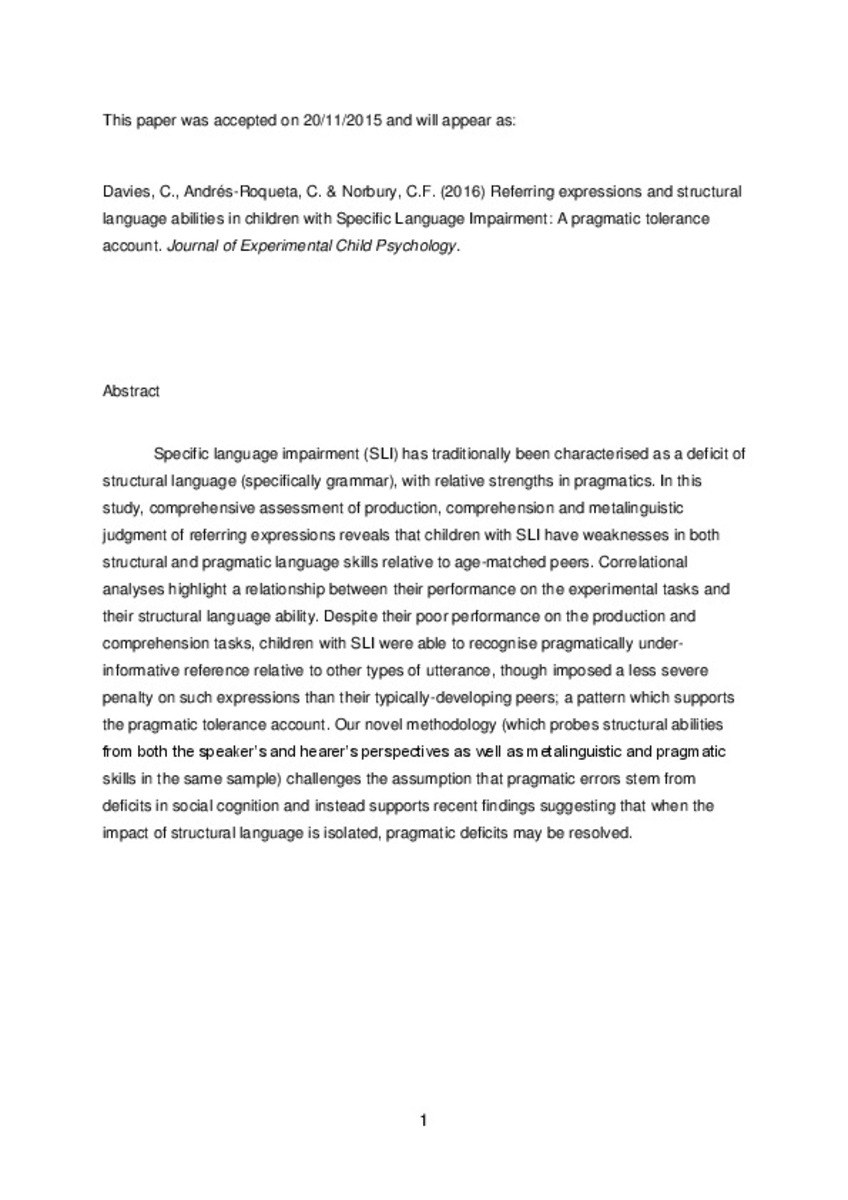Mostrar el registro sencillo del ítem
Referring expressions and structural language abilities in children with specific language impairment: A pragmatic tolerance account
| dc.contributor.author | Davies, Catherine | |
| dc.contributor.author | Andrés-Roqueta, Clara | |
| dc.contributor.author | Norbury, Courtenay Frazier | |
| dc.date.accessioned | 2016-04-13T14:12:28Z | |
| dc.date.available | 2016-04-13T14:12:28Z | |
| dc.date.issued | 2016 | |
| dc.identifier.issn | 0022-0965 | |
| dc.identifier.issn | 1096-0457 | |
| dc.identifier.uri | http://hdl.handle.net/10234/158354 | |
| dc.description.abstract | Specific language impairment (SLI) has traditionally been characterized as a deficit of structural language (specifically grammar), with relative strengths in pragmatics. In this study, comprehensive assessment of production, comprehension, and metalinguistic judgment of referring expressions revealed that children with SLI have weaknesses in both structural and pragmatic language skills relative to age-matched peers. Correlational analyses highlight a relationship between their performance on the experimental tasks and their structural language ability. Despite their poor performance on the production and comprehension tasks, children with SLI were able to recognize pragmatically under-informative reference relative to other types of utterance, although they imposed a less severe penalty on such expressions than typically developing peers, a pattern that supports the pragmatic tolerance account. Our novel methodology (which probed structural abilities from both the speaker’s and hearer’s perspectives as well as metalinguistic and pragmatic skills in the same sample) challenges the assumption that pragmatic errors stem from deficits in social cognition and instead supports recent findings suggesting that when the impact of structural language is isolated, pragmatic deficits may be resolved. | ca_CA |
| dc.description.sponsorShip | European Science Foundation's EURO-XPRAG Research Network Program. Fundacio Caixa-Castello. P1-1B2010-16 Conselleria de Educacion, Cultura y Deporte of Generalitat Valenciana. GV/2015/092 Spanish Ministerio de Ciencia e Innovacion. EDU2010-21791 | ca_CA |
| dc.format.extent | 31 p. | ca_CA |
| dc.format.mimetype | application/pdf | ca_CA |
| dc.language.iso | eng | ca_CA |
| dc.publisher | Elsevier | ca_CA |
| dc.relation.isPartOf | Journal of Experimental Child Psychology Volume 144, April 2016, Pages 98–113 | ca_CA |
| dc.rights | Copyright © 2015 Elsevier Inc. All rights reserved. | ca_CA |
| dc.rights.uri | http://rightsstatements.org/vocab/InC/1.0/ | * |
| dc.subject | Specific language impairment | ca_CA |
| dc.subject | Reference | ca_CA |
| dc.subject | Referring expressions | ca_CA |
| dc.subject | Informativeness | ca_CA |
| dc.subject | Pragmatics | ca_CA |
| dc.subject | Social cognition | ca_CA |
| dc.title | Referring expressions and structural language abilities in children with specific language impairment: A pragmatic tolerance account | ca_CA |
| dc.type | info:eu-repo/semantics/article | ca_CA |
| dc.identifier.doi | http://dx.doi.org/10.1016/j.jecp.2015.11.011 | |
| dc.rights.accessRights | info:eu-repo/semantics/openAccess | ca_CA |
| dc.relation.publisherVersion | http://www.sciencedirect.com/science/article/pii/S0022096515002866 | ca_CA |
| dc.type.version | info:eu-repo/semantics/acceptedVersion | ca_CA |
Ficheros en el ítem
Este ítem aparece en la(s) siguiente(s) colección(ones)
-
PSI_Articles [589]
Articles de publicacions periòdiques







